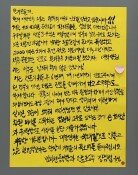Minumsa chairman passes away
Minumsa chairman passes away
Posted January. 23, 2017 07:12,
Updated January. 23, 2017 07:17
Writers and publishers gathered at Seoul National University Hospital Funeral Hall mourned for the funeral of Chairman Park Maeng-ho of Minumsa who passed away on Sunday. “We are numbed to lose the ‘eternally-active’ Park at a time when a strong leader’s advice is crucial for the publishing circle,” they said.
Park was born at Biryongso village, Boeun County, North Chungcheong Province. The name of this home village became a brand for children’s label published by Minumsa in 1994.
Park dreamed of becoming a novelist when he was young. After entering Department of French Literature at Seoul National University in 1952, Park was awarded for his short-novel “The Habit of Sunflower” under his pen name called “Park Seong-heum” at the contest held to commemorate the first publishing of the news magazine “Modern Public Opinions.” In 1955, he submitted his short-novel “Free Customs” at the annual Spring literary contest held by Hankook Daily, but was dropped out under the censorship for satirizing the then-ruling Liberal Party.
Since then, he helped his father Park Ki-jong run for the National Assembly, and then opened Minumsa at the 10-squaremeter rooftop house at Cheongjin-dong, Jongno-gu, Seoul in May 1966. “Small rooftop house were filled with writers including Goh Eun and Lee Moon-yeol and fellow publishers every night,” Hangilsa CEO Kim Eon-ho said. “After they eye-shopped at Jongno Bookstore, they used to drop by Minumsa to enjoy a free drink.”
Park joined hands with poet Goh Eun and literary critic Kim Hyun to create a sensation in the literary circle by publishing the then non-popular poem collection including “Anthology of World Poets” or “Today’s Poets” in the 1970s. These collections allowed the release of numerous poems were shone including “Gigantic Root” (Kim Soo-young), “Cheoyong” (Kim Choon-soo), “At the Inn” (Cheon Sang-byung), “Resurrection” (Goh Eun), “The Wind of Thousand Years” (Park Jae-sam), “Snow Falling in the South” (Hwang Dong-kyu) and many more.
For the first time in Korea as a published book, the collection was printed in 12.5 by 20.5 centimeters with horizontal writing. “Vertical writing was an ugly vestige from the Japanese colonial years, still left in the Korean literature circle, and no one other than the late Park was eager to push Korean literature out of the looming Japanese literature,” said Edited Culture Laboratory CEO Jang Eun-soo, who led Minumsa from 2006 to 2014.
In 1976, Park issued the quarterly “World Literature,” and established the “Today’s Writer Award” the following year. The “Kim Soo-young Literature Award,” which was established in 1981, is still commending young artists. Park’s interest went beyond literature, and stretched further to literary theory, ideology, scholarly books as well. From 1977 to the mid-1990s, Park’s “Idea Collection” introduced world’s famous collections such as Walter Benjamin’s “Literary Art Theory.” Between 1983 and 1999, a total of 424 books were published under the name of “Daewoo Collection of Academic Literary.”
“Park was not only a great CEO, but also an excellent administrator who led the Korean publishing industry such as spearheading the Korean Publishers’ Association, and laid the foundation for junior publishers with as vision,” said Han Seong-bong, CEO of South Asia. Elected as the 45th Chairman of the Korean Publishers’ Association in 2005, Park successfully held the Frankfurt International Book Fair as the guest-country of honor in Germany.
“I paid a visit while Park was in bed 10 days ago,” said Yoon Cheol-ho, chairman of Korea Publishers Society. “While the Minumsa chairman was not able to move freely, he was still able to ‘converse only with sharp eyes.’ That was our final moment, and I feel like losing a big lamp which used to shine the path.”
Taek Kyoon Sohn sohn@donga.com
Headline News
- Med professors announce intention to leave hospitals starting Thursday
- Bridge honoring Sgt. Moon Jae-sik unveiled in Pennsylvania
- Chief of Staff Chung tells presidential secretaries to stay away from politics
- US FTC bans noncompete agreements
- N. Korea launches cyberattacks on S. Korea's defense companies







